Characteristics
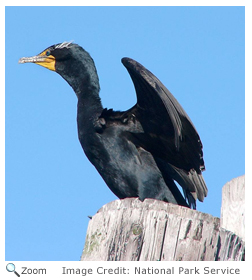 The double-crested cormorant is a little more than two feet long with a wingspan of about four feet. It has dark brown to black feathers, a long hooked bill with an orange throat pouch, a long tail, and webbed black feet. Adults have tufts of feathers over their eyes.
Males and females look alike. The double-crested cormorant is a little more than two feet long with a wingspan of about four feet. It has dark brown to black feathers, a long hooked bill with an orange throat pouch, a long tail, and webbed black feet. Adults have tufts of feathers over their eyes.
Males and females look alike.
Range
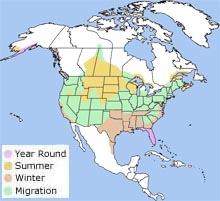 The double-crested cormorant breeds from the coast of Alaska and Nova Scotia south to Mexico and the Bahamas. The double-crested cormorant breeds from the coast of Alaska and Nova Scotia south to Mexico and the Bahamas.
It winters on both coasts north to southern Alaska and southern New England.
Habitat
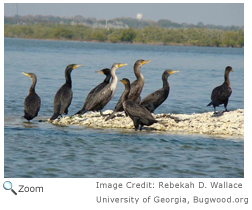 The double-crested cormorant lives in brackish and freshwater habitats on lakes, rivers, swamps, bays and coasts. The double-crested cormorant lives in brackish and freshwater habitats on lakes, rivers, swamps, bays and coasts. |
|
Diet
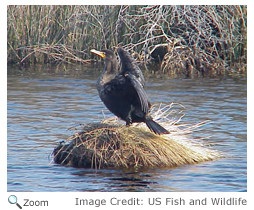 The double-crested cormorant dives for fish and marine invertebrates from the water's surface. After catching a fish, the cormorant surfaces, flips the fish in the air and swallows it head-first. The double-crested cormorant dives for fish and marine invertebrates from the water's surface. After catching a fish, the cormorant surfaces, flips the fish in the air and swallows it head-first.
Reproduction
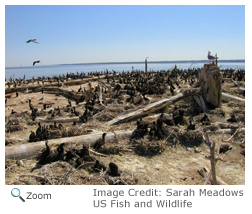 The double-crested cormorant nests in colonies. Both the male and female will build a nest of sticks, twigs and seaweed. Nests are built in trees and shrubs and on the ground of rocky cliffs and islands. The female lays three to five eggs. Both parents incubate the eggs for about a month. Both parents also feed and take care of the chicks. The chicks fledge in 35-40 days.
Behavior
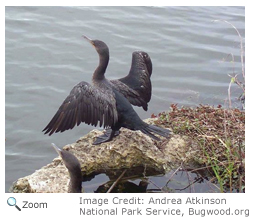 The double-crested cormorant doesn't have well-developed oil glands and isn't waterproofed very well. It often dries its feathers by perching on a pole or tree limb and stretching its wings out. |